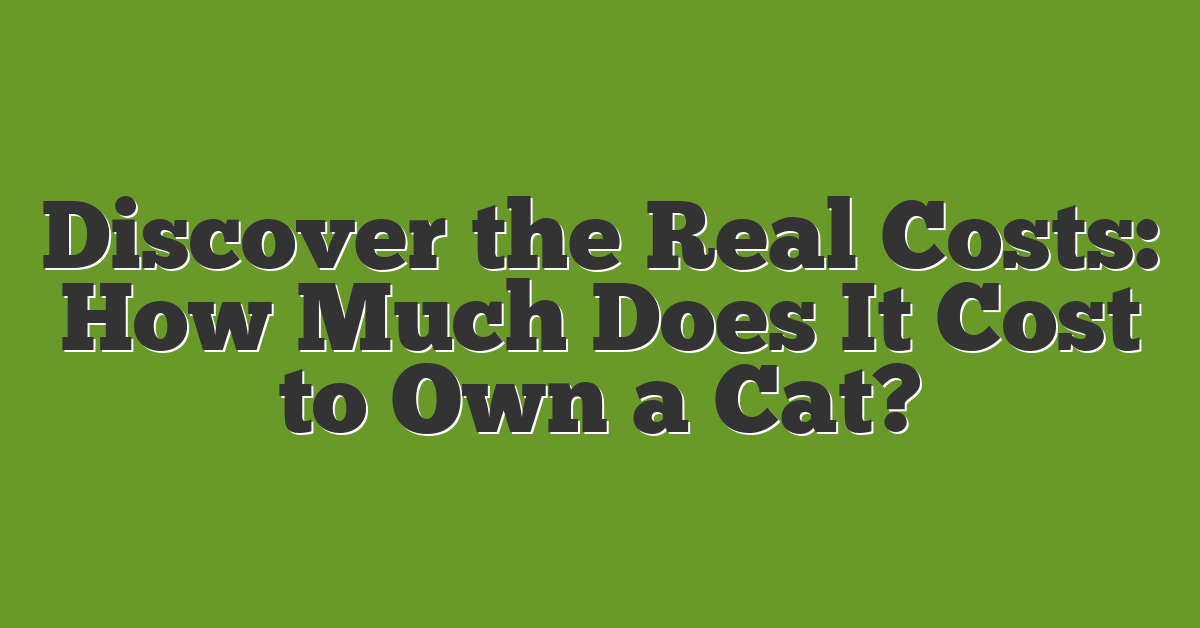Factors to Consider in Cat Ownership Costs
Owning a cat can bring so much joy and companionship into your life, but it’s important to be aware of the financial responsibilities that come along with it. Here are some key factors to consider when it comes to the costs of cat ownership:
1. Adoption or Purchase: Before bringing a cat into your home, you’ll need to decide whether to adopt from a shelter or purchase from a breeder. Adoption fees usually range from $50 to $150, while the cost of a purebred cat can vary significantly.
2. Initial Expenses: Once you bring your new furry friend home, there will be some initial costs to consider. These may include a litter box, a scratching post, toys, and essentials like food and water dishes. These initial supplies can add up to around $100 to $200.
3. Medical Expenses: Just like humans, cats require regular medical care. This includes vaccinations, spaying or neutering, annual check-ups, and flea and tick prevention. On average, you can expect to spend around $200 to $500 per year on these medical expenses.
4. Food and Treats: Feeding your cat a balanced and nutritious diet is essential for their health and well-being. The cost of cat food can vary depending on the brand and quality, but you can expect to spend around $20 to $50 per month on food and treats.
5. Litter and Supplies: Keeping your cat’s litter box clean and stocked with litter is an ongoing expense. The cost of litter can range from $10 to $30 per month, depending on the type you choose. Additionally, you may need to budget for supplies like litter box liners and scoops.
6. Emergency Vet Care: Accidents and illnesses can happen, and unexpected vet bills can quickly add up. It’s a good idea to have an emergency fund or consider pet insurance to help mitigate the cost of any unexpected medical expenses.
7. Cat-Sitting or Boarding: If you plan on traveling or need someone to look after your cat while you’re away, you may need to factor in the cost of cat-sitting or boarding. These services can range from $15 to $30 per day, depending on your location.
One-time Expenses of Owning a Cat
When you decide to bring a furry feline friend into your home, there are some initial expenses to consider. These one-time costs are important to factor into your budget. Let’s take a look at what these expenses might include:
- Adoption or Purchase Fees: If you choose to adopt a cat from a shelter, there may be an adoption fee involved. This fee typically covers things like vaccinations, spaying/neutering, and microchipping. In some cases, you might decide to purchase a cat from a breeder, in which case the cost can vary greatly depending on the breed and its pedigree.
- Initial Supplies: Your new cat will need some basic supplies to get started. This may include items like a litter box, litter, food and water bowls, a scratching post, and toys. These items can add up, so it’s a good idea to shop around for the best prices or consider buying second-hand items.
- Medical Expenses: It’s important to take your cat to the vet for a check-up soon after bringing them home. This visit usually involves vaccinations, deworming, and a general health examination. These initial medical expenses are crucial for ensuring the well-being of your new furry friend.
- Microchipping and Identification Tags: It’s a good idea to get your cat microchipped, which involves inserting a tiny chip under their skin that can be scanned to reveal your contact information. In addition, getting an identification tag with their name and your contact information is essential in case they ever get lost.
Remember, these one-time expenses are just the beginning. Owning a cat also comes with ongoing costs, such as food, veterinary care, and grooming. But don’t worry, we’ll cover those in the next sections of this article!
Recurring Costs of Owning a Cat
When it comes to owning a cat, there are some recurring costs that you need to consider. While cats are known for being independent and low maintenance, there are still expenses that come with their care. Here are some key recurring costs to keep in mind:
- Food: Your furry friend needs to eat, and cat food can be a significant expense. The cost of cat food can vary depending on the brand, type, and quality. It’s essential to choose a diet that meets their nutritional needs. Keep in mind that as your cat grows or ages, their dietary requirements may change, which could impact the cost of their food.
- Litter: Another recurring cost when it comes to owning a cat is litter. Providing a clean and sanitary environment for your cat is crucial, and litter is a necessary expense. The cost of litter can vary depending on the type and brand you choose. Some cats may prefer clumping litter, while others may prefer non-clumping. It’s important to find the right option for your furry friend.
- Veterinary Care: Regular veterinary care is essential to keep your cat healthy. This includes vaccinations, annual check-ups, and preventive treatments for fleas, ticks, and worms. Veterinary costs can add up, so it’s important to budget for these expenses. Consider getting pet insurance to help cover the cost of unexpected medical bills.
- Grooming: While cats are known for their self-grooming abilities, they may still need some assistance in maintaining their coat. Long-haired cats, in particular, may require more grooming to prevent matting. Regular brushing and occasional trips to a professional groomer are additional recurring costs to factor in.
- Toys and Enrichment: Keeping your cat entertained and mentally stimulated is important for their overall well-being. Toys and enrichment activities help prevent boredom and can also provide exercise. Consider budgeting for interactive toys, scratching posts, and other forms of enrichment to keep your cat happy and engaged.
Remember, these are just some of the recurring costs associated with owning a cat. Factors like your cat’s age, breed, and specific medical needs can impact the overall expenses. By being aware of these costs and budgeting accordingly, you can provide the best care for your feline companion.
Veterinary Care and Health Expenses
As a cat lover, you know that your feline friend’s health is a top priority. Regular veterinary care is essential to keep your cat happy and healthy. However, it’s important to consider the expenses involved.
Annual check-ups are crucial to catch any potential health issues early on. During these visits, your vet will perform a thorough examination, update vaccinations, and may recommend additional tests or treatments. The cost of these check-ups can vary depending on your location and the vet’s fees.
Routine vaccinations are necessary to protect your cat from harmful diseases. Core vaccines, such as the rabies and feline distemper vaccines, are typically recommended. Depending on where you live, additional non-core vaccines may be suggested, such as the feline leukemia vaccine. Vaccinations cost around $50 to $100 per year, considering both the cost of the vaccines and the veterinary fees.
Preventive medications play a crucial role in keeping your cat healthy. Flea and tick preventives, for example, help protect your cat from parasites that can cause discomfort and transmit diseases. Heartworm preventives are another essential medication, especially if you live in an area where heartworm disease is prevalent. The cost of these medications can vary depending on the brand, size of your cat, and the length of treatment needed.
Unexpected health issues can arise, and it’s important to be financially prepared. Vet visits for illnesses or injuries can be costly, especially if tests, medications, or surgeries are required. Having an emergency fund for pet healthcare is a responsible move. This will give you peace of mind knowing that you can provide the necessary care if your cat falls ill or gets injured.
Remember, pet insurance is also an option to consider. It can help offset the costs of veterinary care, ensuring that your cat receives the best possible treatment without breaking the bank. Pet insurance premiums typically range from $20 to $50 per month, depending on factors such as your cat’s age, breed, and the coverage you choose.
Providing your beloved cat with proper veterinary care is a commitment that comes with a price tag. By budgeting for veterinary expenses, you can ensure that your furry friend receives the necessary care to live a long and healthy life.
Additional Costs to Budget for
As a cat lover, you already know that owning a cat brings so much joy and companionship into your life. But it’s important to remember that being a responsible cat owner also comes with financial responsibilities. In addition to the routine veterinary care and health expenses we discussed earlier, there are a few more costs that you should budget for to ensure your furry friend’s wellbeing. Here are some additional expenses to consider:
- Food: Your cat needs a nutritious and balanced diet to stay healthy. Good quality cat food can range in price, so it’s important to choose a brand that fits within your budget without compromising on the nutritional needs of your furry friend.
- Cat litter: Keeping your cat’s litter box clean is essential for their hygiene and overall health. Cat litter can be a recurring expense, and prices may vary depending on the brand and type you choose. Consider the long-term cost of litter when deciding which one is right for you.
- Toys and enrichment: Cats are curious creatures and need mental stimulation to prevent boredom. Budget for toys, scratching posts, and other forms of enrichment to keep your cat entertained and engaged. This will also help protect your furniture from scratches and keep your cat active and happy.
- Grooming: Depending on the breed and coat type, your cat may require regular grooming to maintain their fur and overall cleanliness. This can include brushing, nail trimming, and occasional baths. Consider the cost of grooming tools and if necessary, budget for professional grooming services.
- Pet insurance: While it’s not a mandatory expense, pet insurance can provide peace of mind by helping to cover unexpected veterinary expenses. In fact, a study found that pet owners with insurance are more likely to seek veterinary treatment, ensuring that their cats receive the necessary care when they need it most. Research different insurance plans and consider if it’s a viable option for your financial situation.
Remember, these additional costs are important to factor into your budget to provide the best care for your feline friend. By planning ahead and prioritizing their wellbeing, you can ensure that your cat leads a happy and healthy life.
Conclusion
Owning a cat comes with financial responsibilities, but the love and companionship they bring make it all worthwhile. In addition to routine veterinary care, there are other costs to consider. Budgeting for food, cat litter, toys and enrichment, grooming, and pet insurance is essential to provide the best care for your feline friend.
Remember, cats have unique needs and preferences, so it’s important to choose quality products that suit them. Investing in high-quality food and litter can contribute to their overall health and happiness. Providing toys and enrichment activities can keep them mentally stimulated and prevent boredom.
While these costs may seem overwhelming at first, with proper planning and budgeting, you can ensure that your cat receives the care they deserve. Consider setting aside a monthly amount specifically for your cat’s needs. This way, you can enjoy the wonderful experience of cat ownership without financial stress.
By understanding the financial responsibilities of owning a cat and factoring in these costs, you can provide a happy and healthy life for your furry companion. So, go ahead and welcome a cat into your home, knowing that you are well-prepared to meet their needs and give them a loving forever home.
Frequently Asked Questions
Q: What are the financial responsibilities of being a cat owner?
A: As a cat owner, you should budget for routine veterinary care, including vaccinations and check-ups. Additionally, you will need to purchase food, cat litter, toys, and enrichment items on an ongoing basis. Grooming costs, such as brushes and nail trimmers, should also be considered. Pet insurance is recommended to cover unexpected veterinary expenses.
Q: Why is it important to factor in these costs?
A: By factoring in these costs, you can ensure that your cat receives the necessary care and attention it deserves. Regular veterinary care helps maintain their health, while proper nutrition and environmental enrichment contribute to their overall well-being. Taking care of these financial responsibilities ensures that your cat lives a happy and healthy life.
Q: How can I manage these expenses?
A: Start by creating a budget specifically for your cat’s needs. Plan in advance for routine veterinary care and set aside money for food and supplies. Look for sales and discounts on pet products. It’s also a good idea to compare pet insurance plans and choose one that fits your budget. By managing these expenses wisely, you can provide the best care for your furry friend without breaking the bank.

















